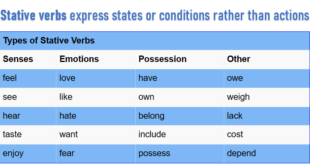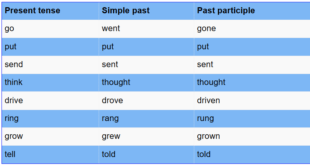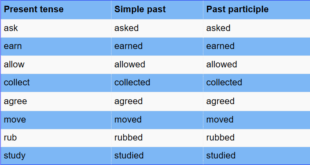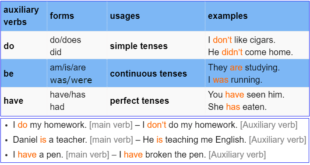Stative verbs (also called state verbs) express states or conditions rather than actions. I want some chocolate. I have a cellphone. We own this car. He needs more time. Types of Stative Verbs Senses Emotions Possession Other feel love have owe see like own weigh hear hate belong …
Read More »Irregular verbs
Irregular verbs do not follow the -d, -ed, or -ied suffix pattern in their past and past participle forms. Present tense Simple past Past participle go went gone put put put send sent sent think thought thought drive drove driven ring rang rung grow grew grown tell told told To …
Read More »Regular verbs
Regular verbs have a usual ending in their past and past participle forms. Present tense Simple past Past participles ask asked asked earn earned earned allow allowed allowed collect collected collected agree agreed agreed move moved moved rub rubbed rubbed study studied studied For verbs that end in “e”, …
Read More »Auxiliary verbs
Auxiliary verbs (also called Helping verbs) are verbs that help main verbs to show their tenses, question forms, negative forms etc. auxiliary verbs forms usages examples do do/does did simple tenses I don’t like cigars. He didn’t come home. be am/is/are was/were continuous tenses They are studying. I was …
Read More »Phrases
Phrases A phrase is a group of related words that does not have a subject verb combination and cannot stand alone as a sentence. Types of phrases Function Examples Noun phrase as a noun All these books are mine. Verb phrase as a verb We have fixed the roof. Adjective …
Read More »


